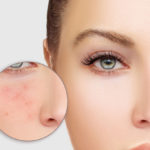From drug stores to commercials, the term “sensitive skin” is thrown around a lot in the beauty industry. But what does it really mean to have sensitive skin?
Unfortunately, the term sensitive skin is just vague enough to make everyone feel like the phrase applies to them. But this post will help unbox some common misconceptions about sensitivity as well as offering solutions to many persistent problems of those with sensitive skin.
What is sensitive skin?
Many people can judge for themselves whether or not they truly have sensitive skin. Ask yourself a few questions:
- Have I had at least three reactions to skin products like soap, moisturizer, etc.?
- Has a product ever caused itching?
- Do you take precautions when trying new products out because of a previous bad experience?
- Are you sensitive to fragrances?
If you answered yes to any of those then you most likely have sensitive skin of some type. However, the problem is that the term “sensitive skin” isn’t a medical term that’s used to diagnose a patient. It’s more of an umbrella phrase for anyone whose skin reacts more frequently to products, whether it’s irritation or an allergic reaction.
Is there a difference between irritated and allergic reactions?
Yes.
Something as easy as overdoing a scrub, exfoliator, or harsh product can leave normal skin types irritated and red at the application site.
Overdoing a product affects the skin by stripping it of nutrients and the protection it needs, which can leave it raw and irritated. This can easily be fixed by cutting back on the number of times you use an irritating product per week or going to a lower percentage of the ingredient causing the issue.
An allergic reaction, on the other hand, happens when an ingredient you use causes the immune system to attack. This can result in red bumps, eczema, itching, hives, and other symptoms in more severe cases like swelling. It’s typically an ingredient in the product you’re using that triggers this response from your body, not the entire product. In this instance, your skin is “sensitive” to a part of your skincare routine. Try switching to a more neutral brand of skincare products that often lack fragrances and allergens. However, beware of products advertised as fragrance-free or hypoallergenic, as this may not necessarily be true. Always do your research before purchasing a new skincare product.
At-home fixes and the best products to use.
While these small fixes may not entirely remedy your sensitive skincare problems, they can help alleviate your symptoms while you wait to meet with a dermatologist.
- If the problem keeps getting worse instead of improving, despite using the same skincare routine religiously, the routine may be the problem. Ease up on your daily skincare habits until the itching, red, or other symptoms heal. Some should consider getting a product with less harsh ingredients.
- When a problem persists, stop your routine and switch to a neutral cleanser like Cetaphil or Free & Clear. If it keeps burning or itching with these, use a petroleum jelly like Vaseline.
- Beware of weather: Avoid extreme cold or wind and cover up from direct sunlight.
- Over-the-counter creams for itch relief can often make your problem worse. Avoid products like lidocaine creams and antibiotic ointments.
- Sometimes an oral antihistamine can bring down symptoms if it’s an allergic reaction.
While this knowledge may help you narrow your field when it comes to knowing what’s best for your skin, it’s always best to make an appointment with a dermatologist. They understand the nuances of skincare without relying on broad terms like “sensitive” to treat what’s wrong properly. So, if you think anything here may apply to you, call your dermatologist.
Dermatology Associates offers a full spectrum of leading-edge medical, surgical, and cosmetic dermatology services from offices in Savannah and Vidalia.


